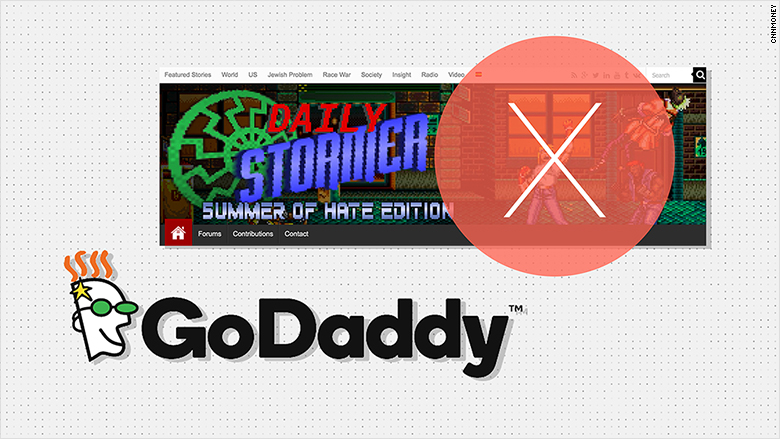
Neo-Nazi website The Daily Stormer found a temporary home on the Russian internet after American tech companies refused to host it.
GoDaddy (GDDY) canceled the website's registration on Monday after The Daily Stormer published a derogatory story about Heather Heyer, who was killed while protesting against a white supremacist rally in Charlottesville, Virginia, on Saturday.
Google (GOOGL) briefly became the registrar for the site, before it too canceled the site's registration later on Monday for violating its terms of service.
The site, which calls itself "The World's Most Genocidal Republican Website," was forced into the "dark web." That meant it could not be accessed through standard web browsers.
The original website, Dailystormer.com, was still offline Wednesday. But for a while, the site could be accessed at Dailystormer.ru after the domain was registered with the Russian Network Information Center, or RU-CENTER.
Russia's largest domain name registrar confirmed it had registered the site.
Related: Neo-Nazi website loses protection from key tech firm
"I should point out that registry is automatic, so RU-CENTER registers thousands of domains per day," spokesperson Egor Timofeev said in a statement emailed to CNNMoney.
The Daily Stormer's return via the Russian internet turned out to be short-lived. The site became inaccessible later Wednesday after RU-CENTER also suspended its registration.
The move followed a request from Roskomnadzor, the Russian government's media and telecommunication watchdog, Timofeev said.
Adding to the neo-Nazi site's woes, internet company Cloudflare said it would no longer protect the neo-Nazi site from cyberattacks.
The Southern Poverty Law Center, which tracks hate groups, says the Daily Stormer spreads "anti-Semitism, neo-Nazism, and white nationalism, primarily through guttural hyperbole and epithet-laden stories about topics like alleged Jewish world control and black-on-white crime."
Related: Should web-hosting companies restrict who's on their platforms?
Russia has recently dialed up its censorship of the internet.
Roskomnadzor has blocked thousands of websites and maintains a long list of banned content.
The list includes websites taken down because of data protection concerns and laws prohibiting the distribution of "gay propaganda", as well as political content the government deems "extremist."
Roskomnadzor did not respond to CNNMoney's request for comment.
-- Kaya Yurieff contributed reporting.

